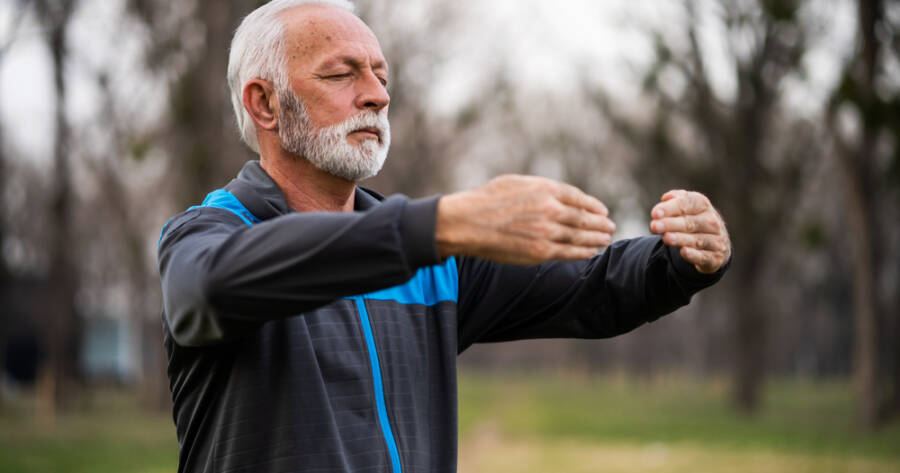As people age, maintaining cognitive health and emotional well-being becomes more important than ever. For seniors, Qi Gong offers a holistic, low-impact practice that can help strengthen both the mind and body. This ancient Chinese tradition, known for its gentle movements and focused breathing, is proving to be a powerful tool for enhancing overall health in older adults. Here’s how Qi Gong is revolutionizing senior health.
What is Qi Gong?
Qi Gong (pronounced “chee-gong”) is a centuries-old practice that combines movement, breath control, and meditation to promote the flow of energy, or “qi,” throughout the body. It focuses on harmonizing the body and mind, improving vitality, and fostering mental clarity. While it has roots in traditional Chinese medicine, Qi Gong has gained recognition worldwide for its ability to promote physical and mental well-being, particularly for older adults.
For seniors, Qi Gong offers a gentle way to engage the body in mindful movement without putting stress on the joints. Unlike more intense exercise routines, it’s accessible to people of all fitness levels. Whether practiced standing or sitting, the exercises can be adapted to suit individual needs, making it an ideal choice for seniors looking for a low-impact, restorative form of exercise.
Improving Cognitive Health Through Movement
One of the most notable benefits of Qi Gong for seniors is its positive impact on cognitive health. As we age, it’s natural to experience some decline in memory, attention, and mental processing. However, regular practice of Qi Gong has been shown to help improve brain function, slow cognitive decline, and enhance overall mental clarity.
The slow, deliberate movements in Qi Gong encourage both the body and the mind to focus. This sustained mental engagement can increase neuroplasticity, which is the brain’s ability to reorganize and form new neural connections. Research suggests that activities involving both physical and mental effort, such as Qi Gong, can help protect against memory loss and conditions like dementia and Alzheimer’s.
Additionally, Qi Gong’s emphasis on deep, controlled breathing can enhance oxygen flow to the brain, supporting cognitive function. Studies have demonstrated that mindful breathing exercises can improve concentration, reduce mental fatigue, and enhance memory recall. For seniors, incorporating Qi Gong into daily routines can be a proactive way to keep their brains sharp as they age.
Boosting Emotional Resilience and Reducing Stress
Emotional health is another area where Qi Gong can have a significant impact. Aging often brings emotional challenges, including loneliness, anxiety, and stress. These feelings can negatively affect seniors’ overall well-being, but practicing Qi Gong has been shown to increase emotional resilience and help manage stress levels effectively.
The meditative aspects of Qi Gong encourage relaxation and mindfulness, allowing practitioners to release tension and quiet the mind. This sense of calm can reduce feelings of anxiety and depression, while promoting a greater sense of emotional balance. Studies have shown that Qi Gong can lower cortisol levels, the hormone associated with stress, helping to create a more peaceful emotional state.
Furthermore, Qi Gong’s focus on self-awareness fosters a deeper connection to one’s emotional state. By practicing regularly, seniors can become more attuned to their emotional needs, learning how to recognize and manage negative feelings. This heightened emotional awareness allows individuals to respond to life’s challenges with greater resilience, fostering mental and emotional well-being.
Physical Benefits That Complement Cognitive and Emotional Health
While the cognitive and emotional benefits of Qi Gong are substantial, its physical advantages should not be overlooked. The slow, flowing movements help improve flexibility, balance, and coordination, which are crucial for seniors to maintain independence and prevent falls.
Qi Gong offers a low-impact way to stretch and strengthen muscles without straining joints, making it suitable for seniors with arthritis, joint pain, or limited mobility. The practice enhances blood circulation, improves posture, and promotes overall physical strength, all of which contribute to greater physical independence.
The gentle nature of Qi Gong also makes it an excellent exercise option for those recovering from injury or surgery. It supports the healing process by encouraging gentle movement, promoting circulation, and reducing stiffness, making it a versatile practice for seniors of all abilities.
Getting Started with Qi Gong
For seniors interested in trying Qi Gong, the first step is to find a comfortable space and a qualified instructor who understands the specific needs of older adults. Many local community centers, gyms, or senior living facilities offer Qi Gong classes designed for seniors. Online tutorials and instructional videos are also available for those who prefer practicing at home.
When beginning, it’s important to start slowly and listen to your body. Qi Gong can be modified to suit any physical ability, so it’s best to ease into the practice and gradually increase the duration and intensity of the sessions. Some seniors may find it helpful to use props, such as chairs for support or cushions for comfort, while performing certain movements.
It’s also essential to focus on breathing deeply and staying mindful throughout the practice. The combination of controlled breathing and slow, deliberate movement is what makes Qi Gong so beneficial for both the body and mind. With time, seniors can enjoy the many physical, mental, and emotional benefits that come from incorporating this practice into their daily routines.
Embracing Qi Gong for Lifelong Health
Qi Gong offers seniors a holistic approach to aging well, addressing physical, cognitive, and emotional health through mindful movement and breathing. Whether improving memory, reducing stress, or enhancing physical strength, this ancient practice provides numerous benefits for older adults.
By embracing Qi Gong, seniors can nurture their overall well-being, fostering a sense of peace, resilience, and vitality as they age. It’s more than just a form of exercise—it’s a path to lifelong health and happiness.

